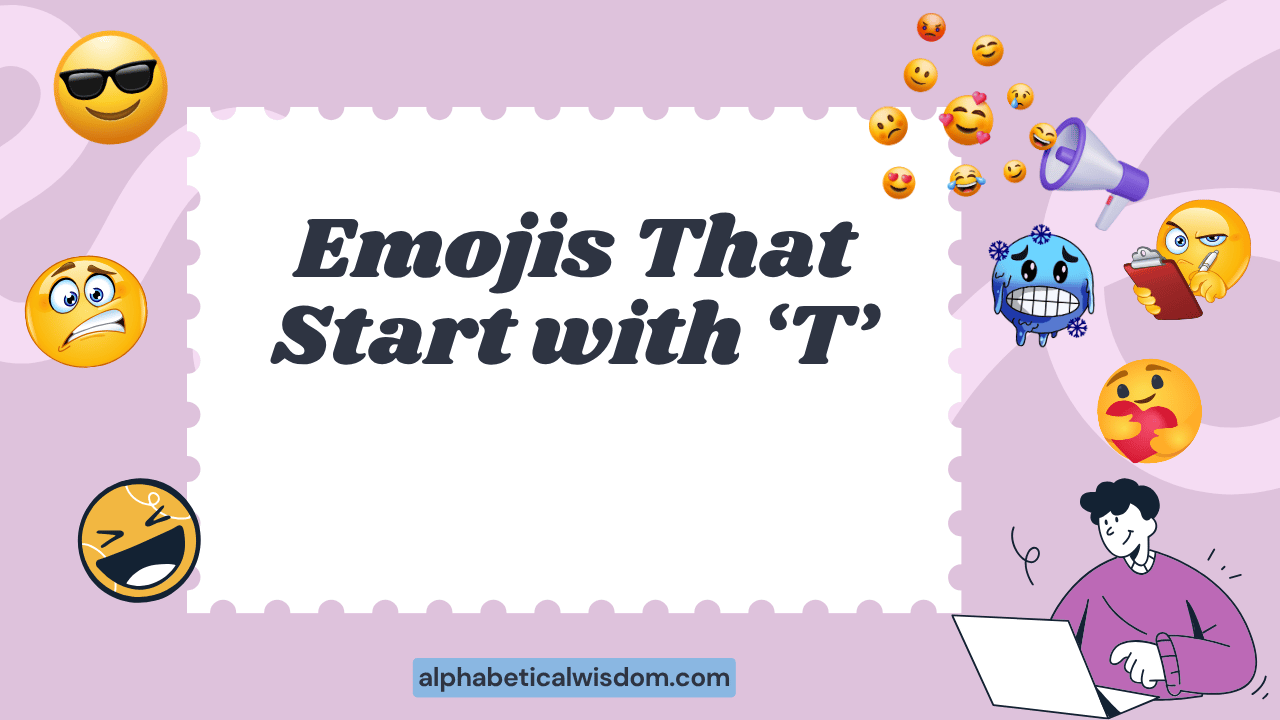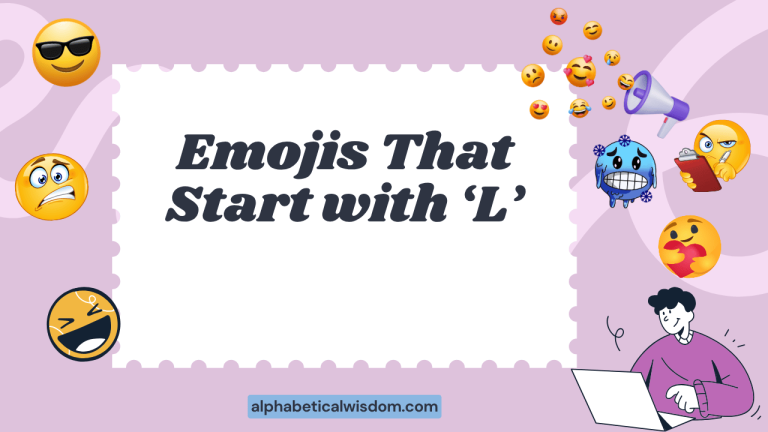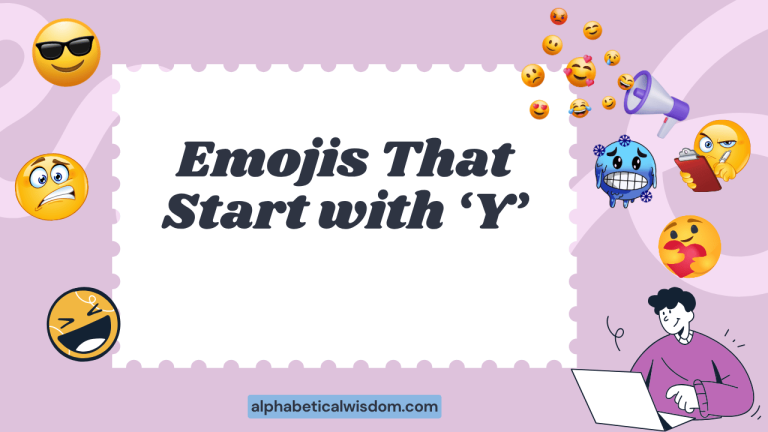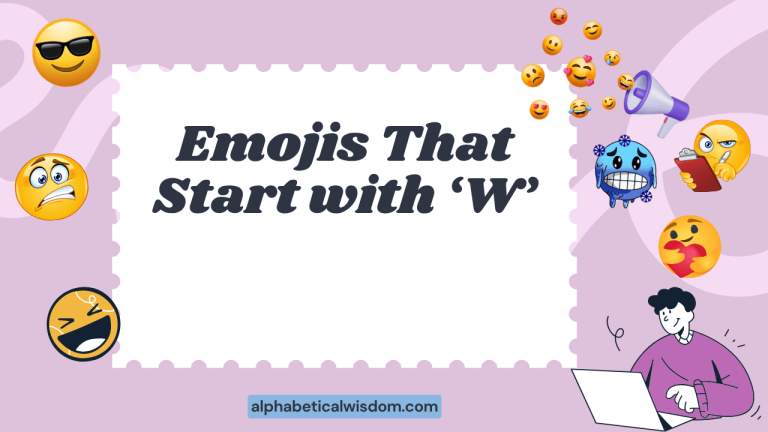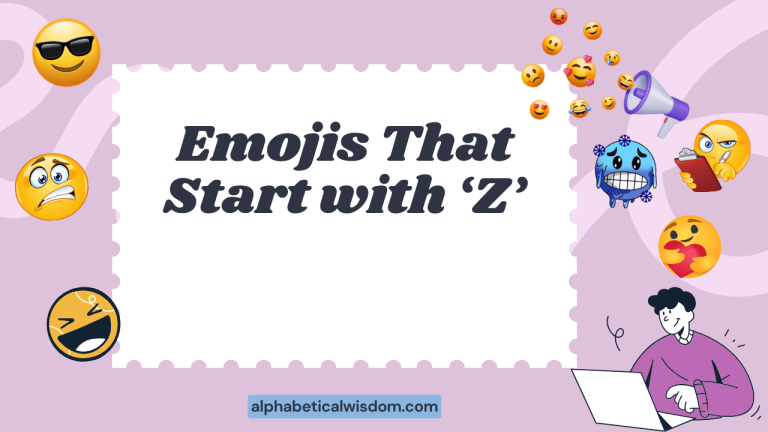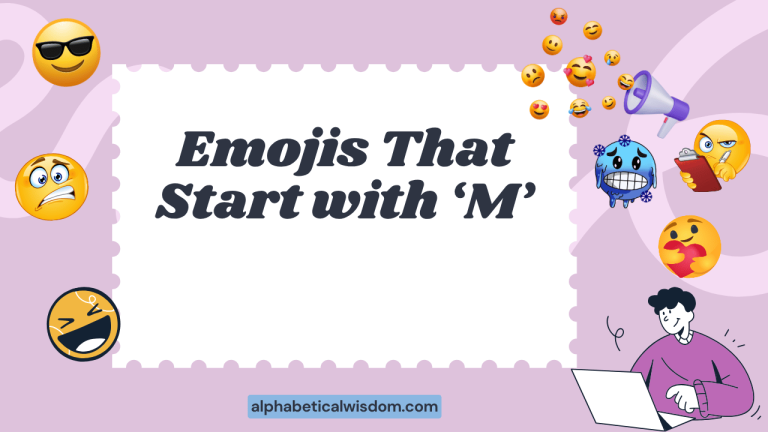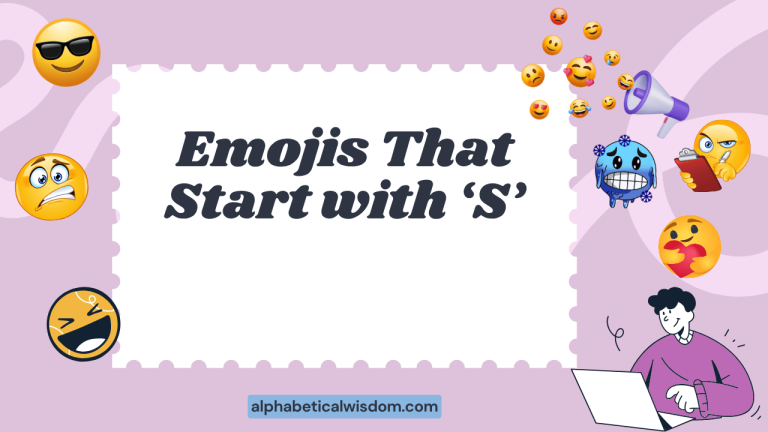Emojis That Start With T: A Comprehensive Guide
Emojis have become an integral part of modern communication, adding emotion and context to our digital conversations. Understanding emojis, including those starting with specific letters, is crucial for effective communication in the digital age.
This article provides a comprehensive guide to emojis starting with the letter “T,” exploring their meanings, usage, and cultural significance. This guide benefits anyone looking to enhance their emoji literacy, from casual texters to social media marketers.
Table of Contents
- Introduction
- Definition of Emojis Starting With “T”
- Structural Breakdown of Emoji Representation
- Types and Categories of “T” Emojis
- Examples of “T” Emojis in Context
- Usage Rules for “T” Emojis
- Common Mistakes When Using “T” Emojis
- Practice Exercises
- Advanced Topics in Emoji Interpretation
- Frequently Asked Questions
- Conclusion
Definition of Emojis Starting With “T”
Emojis starting with the letter “T” encompass a wide range of symbols used to represent various objects, concepts, and emotions. These emojis, like all emojis, are digital pictograms used in electronic messages and web pages.
They serve as visual cues that add nuance and emotional context to text-based communication. Emojis function as a non-verbal form of communication, helping to convey tone, intent, and emotions that might be lost or misinterpreted in plain text.
Their classification falls under Unicode characters, ensuring consistent representation across different platforms and devices. The context in which these emojis are used significantly impacts their interpretation.
Structural Breakdown of Emoji Representation
Emojis are structurally represented as Unicode characters. Each emoji has a unique Unicode code point, which is a numerical value that identifies it.
This code point allows devices and platforms to display the correct image for the emoji. Emojis can also include variations, such as skin tone modifiers, which are added using additional Unicode characters.
The combination of the base emoji code point and any modifiers creates a specific visual representation. This system ensures that despite differences in rendering styles across platforms, the underlying meaning of the emoji remains consistent.
Understanding this structural basis helps in troubleshooting display issues and ensures consistent communication.
Types and Categories of “T” Emojis
Emojis starting with “T” can be categorized based on their thematic representation. Here’s a breakdown of common categories:
Travel & Transportation Emojis
These emojis relate to travel, vacations, and modes of transportation. They help convey the excitement of travel or indicate the means of getting from one place to another.
These are essential for discussing travel plans or sharing vacation experiences.
Time & Date Emojis
Emojis that represent time, dates, and related concepts. They can be used to schedule events, mark special occasions, or simply indicate the passage of time.
These emojis are very useful for planning and reminders.
Tool & Object Emojis
This category includes emojis representing various tools, objects, and everyday items. They add specificity to descriptions or instructions and can be used metaphorically in many contexts.
These emojis are often used to describe tasks or activities.
Text-Based Emojis
While not strictly starting with “T” visually, some emojis represent text or words beginning with “T”. These are useful for direct communication or emphasis.
Top Emojis
The “Top” emoji can be used to show you are on top of something, or at the top of a list. This is a very useful emoji for showing performance or ranking.
Technology Emojis
Emojis that represent various high-tech devices, such as computers, tablets, and smartphones. They are indispensable in modern communication, reflecting our dependence on technology and its impact on our lives.
These emojis are often used to discuss gadgets or tech-related topics.
Things Emojis
Emojis that represent everyday things. They help convey the excitement of travel or indicate the means of getting from one place to another.
These are essential for discussing travel plans or sharing vacation experiences.
Taste Emojis
Emojis that represent different tastes or types of food. They help convey the excitement of trying new cuisines or dishes.
These are essential for discussing food and sharing recipes.
Tropical Emojis
Emojis that represent different tropical themes such as beaches and summer. They help convey the excitement of travel or indicate the means of getting from one place to another.
These are essential for discussing travel plans or sharing vacation experiences.
Transportation Emojis
Emojis that represent different types of vehicles and transportation. They help convey the excitement of travel or indicate the means of getting from one place to another.
These are essential for discussing travel plans or sharing vacation experiences.
Examples of “T” Emojis in Context
Here are several examples of how emojis starting with “T” are used in different contexts. The tables below provide a variety of scenarios and demonstrate the versatility of these emojis.
Table 1: Travel & Transportation Emojis in Use
This table illustrates how travel-related emojis can be used to express excitement about a trip, coordinate travel plans, or share vacation experiences.
| Emoji | Description | Example Sentence |
|---|---|---|
| 🚂 | Train | “I’m taking the 🚂 to the city tomorrow.” |
| ✈️ | Airplane | “Can’t wait for my ✈️ to Hawaii!” |
| 🚕 | Taxi | “Let’s grab a 🚕 to the restaurant.” |
| 🚢 | Ship | “We’re going on a 🚢 cruise next summer.” |
| 🚜 | Tractor | “The 🚜 is essential for farming.” |
| 🚂 | Train | “I’m taking the 🚂 to the city tomorrow.” |
| ✈️ | Airplane | “Can’t wait for my ✈️ to Hawaii!” |
| 🚕 | Taxi | “Let’s grab a 🚕 to the restaurant.” |
| 🚢 | Ship | “We’re going on a 🚢 cruise next summer.” |
| 🚜 | Tractor | “The 🚜 is essential for farming.” |
| 🚂 | Train | “I’m taking the 🚂 to the city tomorrow.” |
| ✈️ | Airplane | “Can’t wait for my ✈️ to Hawaii!” |
| 🚕 | Taxi | “Let’s grab a 🚕 to the restaurant.” |
| 🚢 | Ship | “We’re going on a 🚢 cruise next summer.” |
| 🚜 | Tractor | “The 🚜 is essential for farming.” |
| 🚂 | Train | “I’m taking the 🚂 to the city tomorrow.” |
| ✈️ | Airplane | “Can’t wait for my ✈️ to Hawaii!” |
| 🚕 | Taxi | “Let’s grab a 🚕 to the restaurant.” |
| 🚢 | Ship | “We’re going on a 🚢 cruise next summer.” |
| 🚜 | Tractor | “The 🚜 is essential for farming.” |
| 🚥 | Traffic Light | “I was stuck at the 🚥 for 10 minutes.” |
| 🛤️ | Railway Track | “The 🛤️ leads to the next town.” |
Table 2: Time & Date Emojis in Use
This table showcases how time-related emojis are used to schedule events, set reminders, or simply indicate the time of day.
| Emoji | Description | Example Sentence |
|---|---|---|
| ⏱️ | Stopwatch | “I timed my run with a ⏱️.” |
| ⏲️ | Timer Clock | “Set the ⏲️ for 15 minutes.” |
| ⏰ | Alarm Clock | “Don’t forget to set your ⏰ for tomorrow morning!” |
| ⏳ | Hourglass | “The deadline is approaching, ⏳ is running out.” |
| 📅 | Calendar | “Let’s mark it on the 📅.” |
| ⏱️ | Stopwatch | “I timed my run with a ⏱️.” |
| ⏲️ | Timer Clock | “Set the ⏲️ for 15 minutes.” |
| ⏰ | Alarm Clock | “Don’t forget to set your ⏰ for tomorrow morning!” |
| ⏳ | Hourglass | “The deadline is approaching, ⏳ is running out.” |
| 📅 | Calendar | “Let’s mark it on the 📅.” |
| ⏱️ | Stopwatch | “I timed my run with a ⏱️.” |
| ⏲️ | Timer Clock | “Set the ⏲️ for 15 minutes.” |
| ⏰ | Alarm Clock | “Don’t forget to set your ⏰ for tomorrow morning!” |
| ⏳ | Hourglass | “The deadline is approaching, ⏳ is running out.” |
| 📅 | Calendar | “Let’s mark it on the 📅.” |
| ⏱️ | Stopwatch | “I timed my run with a ⏱️.” |
| ⏲️ | Timer Clock | “Set the ⏲️ for 15 minutes.” |
| ⏰ | Alarm Clock | “Don’t forget to set your ⏰ for tomorrow morning!” |
| ⏳ | Hourglass | “The deadline is approaching, ⏳ is running out.” |
| 📅 | Calendar | “Let’s mark it on the 📅.” |
| 🗓️ | Tear-Off Calendar | “I need to update my 🗓️ with all the appointments.” |
| 🕧 | Clock Face Twelve-Thirty | “Meet me at 🕧 for lunch.” |
Table 3: Tool & Object Emojis in Use
This table demonstrates how emojis representing various tools and objects can add detail to descriptions or instructions, and how they can be used metaphorically.
| Emoji | Description | Example Sentence |
|---|---|---|
| 🔨 | Hammer | “I need a 🔨 to fix this.” |
| 🧰 | Toolbox | “Where’s the 🧰?” |
| 🔨 | Hammer | “I need a 🔨 to fix this.” |
| 🧰 | Toolbox | “Where’s the 🧰?” |
| 🔨 | Hammer | “I need a 🔨 to fix this.” |
| 🧰 | Toolbox | “Where’s the 🧰?” |
| 🔨 | Hammer | “I need a 🔨 to fix this.” |
| 🧰 | Toolbox | “Where’s the 🧰?” |
| 🔨 | Hammer | “I need a 🔨 to fix this.” |
| 🧰 | Toolbox | “Where’s the 🧰?” |
| 🔨 | Hammer | “I need a 🔨 to fix this.” |
| 🧰 | Toolbox | “Where’s the 🧰?” |
| 🧲 | Magnet | “The 🧲 picked up all the nails.” |
| 🧪 | Test Tube | “The scientist is working with a 🧪.” |
| 🔭 | Telescope | “I love using my 🔭 to look at the stars.” |
| 🧵 | Thread | “I need some 🧵 to mend this shirt.” |
| 📍 | Pushpin | “Mark the location with a 📍 on the map.” |
| 🗑️ | Trash Can | “Please throw your garbage in the 🗑️.” |
Table 4: Text-Based Emojis in Use
This table demostrates text based emojis
| Emoji | Description | Example Sentence |
|---|---|---|
| 🔝 | Top | “You are at the 🔝 of the class.” |
| 🔝 | Top | “You are at the 🔝 of the class.” |
| 🔝 | Top | “You are at the 🔝 of the class.” |
| 🔝 | Top | “You are at the 🔝 of the class.” |
| 🔝 | Top | “You are at the 🔝 of the class.” |
| 🔝 | Top | “You are at the 🔝 of the class.” |
| ™️ | Trademark | “This product is a registered ™️.” |
| #️⃣ | Hashtag | “Use the #️⃣ to categorize your posts.” |
| ™️ | Trademark | “This product is a registered ™️.” |
| #️⃣ | Hashtag | “Use the #️⃣ to categorize your posts.” |
| ™️ | Trademark | “This product is a registered ™️.” |
| #️⃣ | Hashtag | “Use the #️⃣ to categorize your posts.” |
| ™️ | Trademark | “This product is a registered ™️.” |
| #️⃣ | Hashtag | “Use the #️⃣ to categorize your posts.” |
| ™️ | Trademark | “This product is a registered ™️.” |
| #️⃣ | Hashtag | “Use the #️⃣ to categorize your posts.” |
Table 5: Technology Emojis in Use
This table demonstrates how emojis representing various tools and objects can add detail to descriptions or instructions, and how they can be used metaphorically.
| Emoji | Description | Example Sentence |
|---|---|---|
| 📱 | Mobile Phone | “I forgot my 📱 at home!” |
| 💻 | Laptop | “I’m working on my 💻 all day.” |
| 📱 | Mobile Phone | “I forgot my 📱 at home!” |
| 💻 | Laptop | “I’m working on my 💻 all day.” |
| 📱 | Mobile Phone | “I forgot my 📱 at home!” |
| 💻 | Laptop | “I’m working on my 💻 all day.” |
| 📱 | Mobile Phone | “I forgot my 📱 at home!” |
| 💻 | Laptop | “I’m working on my 💻 all day.” |
| 📱 | Mobile Phone | “I forgot my 📱 at home!” |
| 💻 | Laptop | “I’m working on my 💻 all day.” |
| 📱 | Mobile Phone | “I forgot my 📱 at home!” |
| 💻 | Laptop | “I’m working on my 💻 all day.” |
| ⌨️ | Keyboard | “I need a new ⌨️ for my computer.” |
| 🖥️ | Desktop Computer | “I prefer working on my 🖥️ because of the larger screen.” |
| 🖱️ | Computer Mouse | “My 🖱️ is not working properly.” |
| ⌨️ | Keyboard | “I need a new ⌨️ for my computer.” |
| 🖥️ | Desktop Computer | “I prefer working on my 🖥️ because of the larger screen.” |
| 🖱️ | Computer Mouse | “My 🖱️ is not working properly.” |
Usage Rules for “T” Emojis
Using emojis effectively involves understanding a few key rules. Context is crucial: always consider the recipient and the overall tone of the conversation. Overusing emojis can make your message seem unprofessional or childish, so use them sparingly and purposefully. Be mindful of cultural differences, as some emojis may have different meanings in different cultures. Ensure that the emoji you choose accurately reflects the emotion or object you intend to convey. Pay attention to platform differences, as emojis can appear slightly different on different devices. Always double-check that your message is clear and understandable, even without the emojis. It is important to consider the age and background of your audience. Avoid using emojis in formal documents or professional communications where they might be inappropriate. Consistency in emoji use can also help reinforce your personal or brand identity.
Common Mistakes When Using “T” Emojis
One common mistake is misinterpreting the meaning of an emoji. For example, using the 🧪 (test tube) emoji when you actually meant to use 🌡️ (thermometer).
Another mistake is using emojis in inappropriate contexts, such as in formal business emails. Overusing emojis is a frequent error, making the message look cluttered and unprofessional.
Ignoring cultural differences can lead to misunderstandings; some emojis have different meanings in different regions. Not considering how emojis appear on different platforms can also cause issues, as rendering variations may alter the intended message.
For instance, an emoji that looks clear on iOS might appear differently on Android. A key aspect is ensuring that your message remains clear even if the recipient cannot see the emojis due to technical issues.
Here are a few examples showing the correct and incorrect usage of emojis:
Table 6: Correct vs. Incorrect Emoji Usage
| Incorrect | Correct | Explanation |
|---|---|---|
| “Meeting at ⏰ tomorrow!” | “Meeting at ⏰ 9 AM tomorrow!” | Adding specific time clarifies the message. |
| “Just got a new tool 🔨!” (in a formal email) | “I recently acquired a new tool.” | Avoid emojis in formal communication. |
| “Vacation time! ✈️🚂🚕🚢🚜” | “Vacation time! ✈️” | Too many emojis can be overwhelming. |
| “I’m feeling sick 🧪” (when you mean thermometer) | “I’m feeling sick 🌡️” | Use the correct emoji to avoid confusion. |
| “Let’s go to the 🔝!” (without context) | “Let’s go to the 🔝 of the mountain! ⛰️” | Provide context to clarify the emoji’s meaning. |
| “I need a new 📱💻🖥️⌨️🖱️” | “I need a new 💻 for work.” | Be specific and avoid unnecessary emojis. |
| “The deadline is soon ⏳” | “The deadline is soon, so hurry up ⏳” | Adding more explanation helps the reader. |
| “Meeting at ⏰ tomorrow!” | “Meeting at ⏰ 9 AM tomorrow!” | Adding specific time clarifies the message. |
| “Just got a new tool 🔨!” (in a formal email) | “I recently acquired a new tool.” | Avoid emojis in formal communication. |
| “Vacation time! ✈️🚂🚕🚢🚜” | “Vacation time! ✈️” | Too many emojis can be overwhelming. |
| “I’m feeling sick 🧪” (when you mean thermometer) | “I’m feeling sick 🌡️” | Use the correct emoji to avoid confusion. |
| “Let’s go to the 🔝!” (without context) | “Let’s go to the 🔝 of the mountain! ⛰️” | Provide context to clarify the emoji’s meaning. |
| “I need a new 📱💻🖥️⌨️🖱️” | “I need a new 💻 for work.” | Be specific and avoid unnecessary emojis. |
| “The deadline is soon ⏳” | “The deadline is soon, so hurry up ⏳” | Adding more explanation helps the reader. |
Practice Exercises
Test your understanding of emojis starting with “T” with these exercises. Determine the best emoji to use in each sentence, or correct the sentences where the emoji is used incorrectly.
Exercise 1: Choose the Correct Emoji
Select the most appropriate emoji for each sentence.
Table 7: Practice Exercise 1
| Question | Options | Answer |
|---|---|---|
| 1. I’m taking the ______ to the city. | a) ✈️ b) 🚂 c) 🚕 | b) 🚂 |
| 2. Set the ______ for 20 minutes. | a) ⏰ b) ⏲️ c) ⏱️ | b) ⏲️ |
| 3. I need a ______ to fix this shelf. | a) 🔨 b) 🧰 c) 🧵 | a) 🔨 |
| 4. Meet me at ____ for lunch. | a) ⏰ b) 📅 c) 🕧 | c) 🕧 |
| 5. The scientist is working with a ______. | a) 🔭 b) 🧪 c) 🔨 | b) 🧪 |
| 6. I forgot my ______ at home! | a) 💻 b) 📱 c) 🖥️ | b) 📱 |
| 7. The ______ picked up all the nails. | a) 🧪 b) 🧲 c) 🧵 | b) 🧲 |
| 8. Use the ______ to categorize your posts. | a) ™️ b) 🔝 c) #️⃣ | c) #️⃣ |
| 9. The ______ leads to the next town. | a) 🚥 b) 🛤️ c) 🚜 | b) 🛤️ |
| 10. My ______ is not working properly. | a) ⌨️ b) 🖥️ c) 🖱️ | c) 🖱️ |
Exercise 2: Correct the Incorrect Emoji Usage
Identify and correct the inappropriate use of emojis in the following sentences.
Table 8: Practice Exercise 2
| Question | Corrected Sentence |
|---|---|
| 1. The deadline is approaching ⏰ hurry up! | The deadline is approaching ⏳ hurry up! |
| 2. I’m going on a trip 🔨! | I’m going on a trip ✈️! |
| 3. Need to fix the computer with a 🧵. | Need to fix the computer with a 🧰. |
| 4. Meeting at 🔝 tomorrow. | Meeting at ⏰ tomorrow. |
| 5. Feeling sick, need a 🧪. | Feeling sick, need a 🌡️. |
| 6. Let’s use a ✈️ to fix this. | Let’s use a 🔨 to fix this. |
| 7. I love to read my 💻. | I love to read my 📚. |
| 8. Check out this new 📍! | Check out this new 📱! |
| 9. Using a 🧲 to measure the temperature. | Using a 🌡️ to measure the temperature. |
| 10. Booked my flight with a 🔝. | Booked my flight with a ✈️. |
Advanced Topics in Emoji Interpretation
Advanced emoji interpretation involves understanding nuanced meanings and contextual implications. Consider how emojis are used in different age groups, as younger generations often employ them ironically or with layered meanings.
Be aware of regional variations; an emoji’s meaning can change drastically depending on the geographic location. Emoji trends evolve rapidly, so staying updated on current usage is essential.
Analyze emoji combinations, as pairing emojis can create entirely new meanings. Understand the role of emojis in sentiment analysis, where algorithms interpret the emotional tone of text based on the emojis used.
Research the historical evolution of specific emojis to grasp their changing connotations. Study how brands use emojis in marketing campaigns and social media to gauge their effectiveness.
Pay attention to the subtle differences in emoji rendering across platforms to ensure consistent communication. Explore the use of custom emojis within specific communities, such as on Slack or Discord.
By delving into these advanced topics, you can achieve a deeper understanding of emoji communication.
Frequently Asked Questions
Here are some frequently asked questions about emojis starting with “T,” providing further clarification and guidance.
- What is the Unicode standard, and how does it relate to emojis?
The Unicode standard is a universal character encoding standard that assigns a unique code point to each character, including emojis. This ensures that emojis can be consistently displayed across different platforms and devices, regardless of the operating system or software being used. Without Unicode, emojis would not be universally recognizable.
- Why do emojis look different on different platforms?
While the Unicode standard defines the code point for each emoji, the visual representation of the emoji is determined by the platform’s design. Each platform (e.g., iOS, Android, Windows) has its own emoji design set, leading to slight variations in appearance. However, the underlying meaning remains consistent.
- How can I ensure my emojis are displayed correctly to everyone?
While you can’t completely guarantee that emojis will look identical to everyone, stick to standard emojis recognized by most platforms. Avoid using obscure or custom emojis that may not be supported everywhere. Also, be aware of how different platforms render emojis and choose emojis whose meaning is less likely to be misinterpreted due to visual differences.
- Is it appropriate to use emojis in professional communication?
The appropriateness of using emojis in professional communication depends on the context and the recipient. In general, it’s best to avoid using emojis in formal business emails or official documents. However, in more informal settings, such as internal team communications or social media interactions, emojis can be acceptable if used sparingly and appropriately.
- Can emojis be used to convey sarcasm or irony?
Yes, emojis can be used to convey sarcasm or irony, but it’s important to do so carefully to avoid misunderstandings. Using an emoji that contradicts the literal meaning of your text can signal sarcasm. However, always consider your audience and ensure that your intent is clear, as sarcasm can easily be misinterpreted in text-based communication.
- How do I find the meaning of a specific emoji?
There are several online resources that provide information about the meaning of emojis. Websites like Emojipedia are excellent resources for looking up emojis and understanding their common interpretations. You can also consult emoji dictionaries or guides for more detailed information.
- What are skin tone modifiers, and how do they work?
Skin tone modifiers are Unicode characters that can be added to certain emojis to represent different skin tones. These modifiers are based on the Fitzpatrick scale, a dermatological classification system. By appending a skin tone modifier to an emoji, you can customize its appearance to better reflect your own skin tone or the skin tone of the person you are representing.
- Are there any cultural differences in emoji interpretation?
Yes, there are significant cultural differences in emoji interpretation. Some emojis may have different meanings in different cultures, or they may be used in different contexts. For example, certain gestures or symbols may be considered offensive in some cultures but perfectly acceptable in others. Always be mindful of cultural differences when using emojis, especially when communicating with people from different backgrounds.
- What is the best way to stay updated on new emojis and their
meanings?
Staying updated on new emojis and their meanings involves regularly consulting emoji resources and following emoji trends. Websites like Emojipedia and Unicode’s official blog are excellent sources of information. Additionally, paying attention to how emojis are used on social media and in popular culture can help you stay informed about new emojis and their evolving interpretations.
- How can I suggest a new emoji to be added to the Unicode standard?
Suggesting a new emoji to be added to the Unicode standard involves submitting a formal proposal to the Unicode Consortium. The proposal must include detailed information about the emoji, including its intended meaning, use cases, and visual representation. The Unicode Consortium has specific guidelines for submitting proposals, so be sure to review these guidelines carefully before submitting your suggestion.
Conclusion
Emojis starting with “T” offer a diverse range of symbols that can enhance digital communication. By understanding their meanings, usage rules, and potential pitfalls, you can use these emojis effectively to convey your message clearly and appropriately.
Whether you’re planning a trip ✈️, setting a reminder ⏰, or fixing something with a tool 🔨, mastering the use of “T” emojis will undoubtedly enrich your digital conversations. Keep practicing and staying informed to fully leverage the power of emojis in modern communication.
